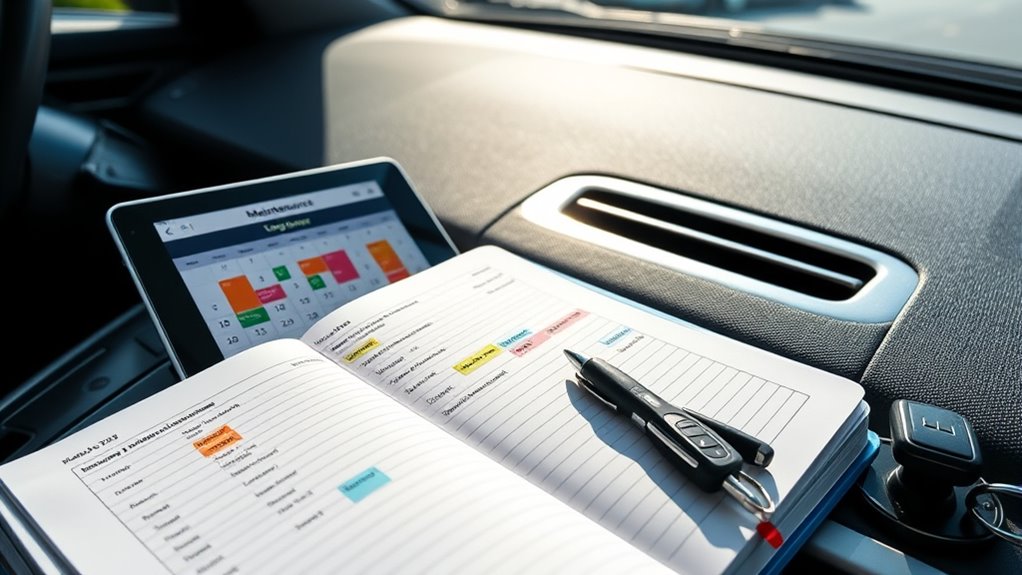Keeping detailed car maintenance records is vital because it helps you track repairs, prove regular upkeep, and supports warranty claims. Organized records can also boost your vehicle’s resale value by showing buyers you’ve maintained it properly. They make insurance claims smoother and protect you from unexpected costs. Staying on top of your maintenance history not only keeps your car in great shape but also offers peace of mind when managing your vehicle’s care. Learn more about how to keep your records effective.
Key Takeaways
- Maintains a detailed history of vehicle upkeep, aiding in future maintenance and repairs.
- Provides essential proof for insurance claims and warranty coverage to prevent disputes.
- Supports warranty validation by showing adherence to manufacturer maintenance schedules.
- Enhances resale value by demonstrating responsible vehicle maintenance to buyers.
- Organizes records for easy access, ensuring peace of mind and smoother claim processes.

Have you ever wondered how to stay on top of your car’s health and avoid costly repairs? One of the most effective ways is by keeping detailed maintenance records. These records serve as a thorough history of everything done to your vehicle, from oil changes to major repairs. Not only do they help you keep track of routine upkeep, but they also play a critical role when it comes to insurance claims and warranty coverage. When you have organized documentation, you can easily prove what maintenance has been performed and when, which can be a game-changer in disputing insurance claims or claiming warranty benefits.
Maintaining meticulous records makes it easier to identify patterns or recurring issues with your vehicle. For example, if your car keeps having similar problems, your maintenance log can reveal underlying issues that might need professional attention. This proactive approach can save you money in the long run by catching problems early before they turn into costly repairs. Additionally, if you ever need to file an insurance claim after an accident or damage, having detailed records of recent repairs or inspections can support your case. Insurance companies often require proof of proper maintenance to validate claims, especially if the damage is related to wear and tear or neglect.
Keeping detailed records helps identify recurring issues and supports insurance claims after accidents or damage.
Warranty coverage is another critical area where detailed records prove invaluable. Most warranties require proof that specific maintenance tasks, like oil changes or brake replacements, were performed regularly and according to the manufacturer’s schedule. Without proper documentation, your warranty claims might be denied or delayed. Keeping receipts, service invoices, and maintenance schedules organized ensures you can quickly provide what’s needed when warranty service is required. This can help you avoid out-of-pocket expenses and ensure your vehicle remains protected under warranty terms.
Moreover, well-maintained records can also boost your vehicle’s resale value. When you’re ready to sell, prospective buyers or dealerships will want to see a complete history of proper maintenance. A detailed log demonstrates that you’ve taken good care of the car, which can lead to a higher selling price. It also reassures buyers that the vehicle has been maintained responsibly, reducing their concerns about future repairs. Keeping detailed maintenance records can give you peace of mind and a competitive edge in the resale market.
Frequently Asked Questions
How Long Should I Keep Maintenance Records?
You should keep maintenance records for at least as long as it takes to cover your car’s warranty period, typically 3-5 years, and beyond for resale value. Proper record retention and document storage guarantee you have proof of upkeep if needed, especially during repairs or disputes. Keep digital or physical copies organized and safe, so you can easily access them when necessary, helping maintain your vehicle’s value and reliability over time.
What’S the Best Way to Organize My Records?
They say a place for everything and everything in its place. To organize your records, start with digital organization by scanning receipts and service logs into folders or apps. Keep paper storage for original documents in labeled binders or folders, and regularly back up digital files. This approach guarantees your records are easy to find, safe, and organized, making future maintenance or resale smoother.
Are Digital Records as Reliable as Paper?
Digital records can be just as reliable as paper if you take proper steps. You should create digital backups and store them securely in the cloud or an external drive to guarantee record security. Regularly updating your files and using strong passwords also help protect your information. With these precautions, digital records become a dependable way to track your car’s maintenance history, offering easy access and organization whenever you need it.
Do Maintenance Records Affect Car Resale Value?
Your maintenance records considerably impact your car’s resale value. A complete service history shows buyers you’ve maintained the vehicle properly, building trust and confidence. When you provide detailed records, it proves you’ve kept up with essential maintenance, which can make your car more attractive and potentially increase its resale price. Whether digital or paper, clear, organized records help showcase your car’s well-maintained status, boosting its resale value.
Can Maintenance Records Help in Warranty Claims?
Yes, maintenance records can help in warranty claims. When you have detailed warranty documentation and a clear repair history, it proves that you’ve followed the manufacturer’s recommended service schedule. This documentation shows that any issues aren’t due to neglect, making your claim more credible. Keeping these records organized guarantees you can easily provide proof of proper maintenance, increasing your chances of a smooth warranty claim process.
Conclusion
So, go ahead and keep those records—you might think it’s a hassle now, but when your car finally refuses to start, you’ll be glad you did. Ironically, staying organized could save you money and headaches, proving that the small effort of maintaining records really pays off. After all, it’s almost funny how something so simple can make such a big difference. Don’t wait until it’s too late—start tracking your car’s maintenance today!








